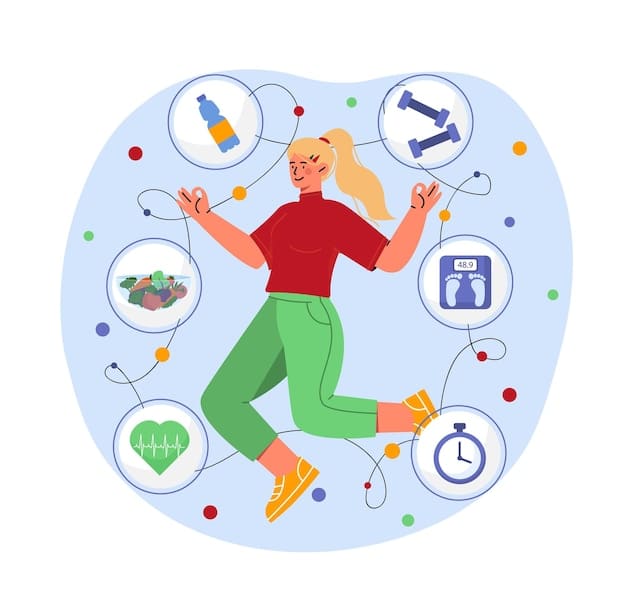Debunking Health Myths: Separating Fact from Fiction for a Healthier You

Three common health myths debunked in this article include the idea that all fats are bad for you, that you need to drink eight glasses of water a day, and that you should stretch before exercising, helping you make more informed choices for your health.
It’s easy to get lost in the whirlwind of health advice circulating online and through word of mouth. Let’s explore three common health myths debunked, providing you with the facts you need to make informed decisions about your well-being.
Common Health Myths: The Impact on Your Well-being
Health myths can have a significant impact on your well-being. Believing in false information can lead to ineffective or even harmful health practices, impacting your physical and mental health. It’s important to base your decisions on reliable and verified information.
Why Health Myths Persist
Health myths persist for several reasons, including misinformation spread through unreliable sources, the desire for quick and easy solutions, and the misinterpretation of scientific studies. Cultural beliefs and traditions can also contribute to the perpetuation of these myths.
- Media sensationalism often exaggerates or distorts research findings.
- Confirmation bias leads people to seek out information that confirms their existing beliefs.
- Lack of critical thinking skills makes it difficult to evaluate the credibility of sources.
Consequences of Believing Health Myths
Believing health myths can have several negative consequences. It can lead to:
- Ineffective treatments and wasted time and money.
- Delayed or inappropriate medical care.
- Increased anxiety and stress related to health concerns.
Ultimately, understanding the facts can empower you to take better care of your health and make well-informed choices.

Myth 1: All Fats Are Bad for You
One of the most pervasive health myths is that all fats are bad for you. In reality, fats are essential for many bodily functions, and not all fats are created equal. Understanding the difference between healthy and unhealthy fats is crucial for maintaining a balanced diet.
The Role of Fats in the Body
Fats play a vital role in several bodily functions, including:
- Providing energy.
- Supporting cell growth.
- Protecting organs.
- Helping the body absorb certain nutrients.
Healthy vs. Unhealthy Fats
There are different types of fats, and some are healthier than others.
- Unsaturated Fats: Considered healthy fats, found in foods like avocados, nuts, seeds, and olive oil. They can help lower cholesterol levels and reduce the risk of heart disease.
- Saturated Fats: Should be consumed in moderation, found in foods like red meat, dairy products, and coconut oil. Excessive intake may raise cholesterol levels.
- Trans Fats: Generally considered unhealthy, often found in processed foods, fried foods, and baked goods. They can raise bad cholesterol levels and lower good cholesterol levels, increasing the risk of heart disease.
Instead of avoiding all fats, focus on incorporating healthy fats into your diet while limiting saturated and trans fats.
Myth 2: You Need to Drink Eight Glasses of Water a Day
Another common health myth is the idea that you need to drink eight glasses of water a day. While staying hydrated is important for overall health, the optimal amount of water intake varies from person to person and getting the right hydration level is key.
The Importance of Hydration
Hydration is essential for several bodily functions, including:
- Regulating body temperature.
- Transporting nutrients.
- Lubricating joints.
- Eliminating waste products.
Factors Affecting Water Needs
Water needs vary based on several factors, including:
- Activity level: Physically active individuals need more water than sedentary individuals.
- Climate: Hot and humid climates can increase water loss through sweat.
- Overall health: Certain medical conditions may affect water needs.
- Diet: Consuming water-rich foods like fruits and vegetables can contribute to hydration.
Instead of rigidly adhering to the eight glasses of water a day rule, pay attention to your body’s thirst cues and adjust your water intake accordingly. Consider also that you can get fluids from other drinks and foods.

Myth 3: You Should Stretch Before Exercising
Many people believe that stretching before exercising helps prevent injuries. However, research suggests that static stretching before a workout may actually reduce performance and may not significantly reduce the risk of injury. The pre-workout routine is important.
The Benefits of Stretching
Stretching offers several benefits, including:
- Improving flexibility.
- Increasing range of motion.
- Reducing muscle tension.
- Promoting relaxation.
Dynamic vs. Static Stretching
There are different types of stretching, and the best approach depends on the context.
- Static Stretching: Holding a stretch for an extended period, typically 15-30 seconds. It is generally better suited for post-workout recovery.
- Dynamic Stretching: Involves active movements that gradually increase range of motion, such as arm circles, leg swings, and torso twists. It is more effective for pre-workout preparation.
Proper Pre-Workout Routine
Instead of static stretching before a workout, focus on dynamic stretching and a warm-up to prepare your muscles for exercise. Save static stretching for after your workout, when your muscles are already warm.
Beyond the Three Myths: A Holistic Approach to Health
Debunking these three common health myths is just the beginning. A holistic approach to health involves considering all aspects of well-being, including physical, mental, and emotional health. A balanced approach to wellness is necessary.
The Mind-Body Connection
Recognizing the connection between the mind and body is crucial for overall health. Stress, anxiety, and depression can all have a physical impact on the body, and conversely, physical health can affect mental well-being.
Practicing mindfulness, meditation, and stress-reduction techniques can help promote mental and emotional well-being, which in turn supports physical health.
The Role of Nutrition
Nutrition plays a vital role in overall health and well-being. A balanced diet rich in fruits, vegetables, whole grains, and lean protein provides the body with the nutrients it needs to function optimally. Minimizing processed foods, sugary drinks, and unhealthy fats can help prevent chronic diseases.
Importance of Sleep
Getting enough sleep is essential for physical and mental health. Sleep allows the body to repair and rejuvenate itself, and chronic sleep deprivation can lead to a variety of health problems, including weakened immunity, increased risk of chronic diseases, and impaired cognitive function.
Taking Control of Your Health Journey
Staying informed and critically evaluating health information is essential for taking control of your health journey. By understanding the facts and debunking common myths, you can make informed decisions that support your overall well-being. Taking action is key to making lasting change.
| Key Point | Brief Description |
|---|---|
| 💪 Fats are Essential | Not all fats are bad: unsaturated fats benefit health. |
| 💧 Hydration Varies | Water intake depends on activity, climate, and health. |
| 🏃 Dynamic Stretching | Dynamic stretches are better pre-workout for flexibility. |
| 🧠 Mind-Body Connection | Mental and physical health are interconnected. |
Frequently Asked Questions
▼
No, saturated fats aren’t necessarily bad, but they should be consumed in moderation. It is essential to get a nutritional consultation to determine optimal levels.
▼
Monitor your thirst and urine color. Pale yellow urine usually means you’re well-hydrated, while dark yellow could indicate dehydration. Don’t wait until you are thirsty to drink more water.
▼
Examples of dynamic stretches include arm circles, leg swings, torso twists, and walking lunges. These movements prepare your muscles dynamically for activity.
▼
Consult healthcare professionals, visit reputable websites like the CDC or NIH, and cross-reference information from multiple sources for accuracy. Always check for credibility markers.
▼
Focus on mental, and emotinal welll-being by practicing mindfulness, eating a balanced diet, and ensuring adequate sleep. These will improve overall health.
Conclusion
In conclusion, three common health myths debunked are just the tip of the iceberg when it comes to navigating the world of health information. By staying informed, questioning assumptions, and adopting a holistic approach to health, you can make the best choices for your well-being. Ultimately, informed decisions lead to a healthier and happier life.





